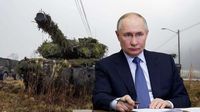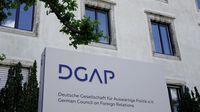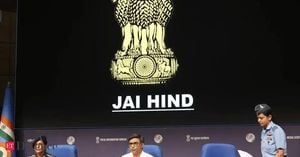In a shocking turn of events, Wladimir Solowjow, a prominent ally of President Vladimir Putin, has boldly declared that Russia is prepared to "wipe Germany off the face of the earth". This inflammatory statement was directed at Friedrich Merz, the likely next Chancellor of Germany, who continues to advocate for military support for Ukraine, including potentially supplying Taurus missiles. As the political landscape in Germany heats up ahead of the upcoming elections, Solowjow's threat underscores the tension surrounding Germany's firm stance against Russia's ongoing aggression in Ukraine.
On Russian state television, Solowjow made it clear that any decision made by Merz to supply hardware could lead to dire consequences. "Now we can strike them," Solowjow stated, reflecting the Kremlin's willingness to retaliate against Germany's support for Ukraine, as reported by Newsweek. He elaborated, noting that this escalation could occur despite warnings from the United States that such actions would be unfounded. This sentiment was echoed by Andrey Sidorov, who claimed that Merz appears more amenable to supplying advanced weaponry to Ukraine than the current Chancellor, Olaf Scholz.
The exchange was further complicated earlier this month when former U.S. President Donald Trump referred to Ukraine's President Volodymyr Zelensky as a "dictator", suggesting that Ukraine bore responsibility for the conflict instigated by Russia. Trump's remarks have faced considerable backlash, prompting reactions from both the German and British governments. German Chancellor Scholz criticized Trump’s assertion as "fundamentally wrong and dangerous", stating that it undermines the democratic legitimacy of Zelensky, a sentiment supported by British Prime Minister Keir Starmer, who affirmed that Zelensky is the duly elected leader of Ukraine.
Just days later, amid growing criticism, Trump appeared to backtrack on his comments regarding Zelensky. At a press conference on February 27, 2025, Trump questioned whether he had ever made that statement and insisted that the forthcoming meeting with Zelensky would be constructive. The meeting, scheduled for February 27, will take place in Washington D.C. and is anticipated to foster dialogue on various fronts, including a controversial resource agreement important for securing critical materials for the U.S.
While the rhetoric heats up, tensions have also extended to the Deutsche Gesellschaft für Auswärtige Politik (DGAP), which was recently declared an undesirable organization by the Russian authorities. According to the General Prosecutor's Office in Moscow, the DGAP supposedly discredits Russia's domestic and foreign policies, coinciding with their advocacy for sanctions against Russia and military aid to Ukraine.
The German Foreign Office condemned the designation, emphasizing that President Putin is increasingly isolating Russia from the international community. "We will continue to support independent Eastern European research and scientific exchange, both within Russia and abroad," stated a representative of the Foreign Office, highlighting a commitment to countering Russia's narrative.
In response to their classification, the DGAP expressed regret, asserting that the decision would set back international dialogue and contribute to further self-isolation of the country. DGAP representatives insisted that their organization has consistently provided detailed and accurate information about Russia's aggressive actions against Ukraine since the outset of the war.
Despite these challenges, the DGAP vowed to continue its mission to inform the German public and political spheres about the implications of the Russian invasion. They claimed, "This work is intended to be discredited by the classification as an undesirable organization by Russian authorities." This declaration highlights the continued commitment to independently research and remain vocal against oppressive tactics employed by the Kremlin.
Throughout this ordeal, it has become clear that the relationship between Germany and Russia is at an all-time low, particularly with regard to the Ukrainian war. As Merz prepares to take a stronger stance against Russia, the threats issued by Solowjow illuminate the risks of continued German support for Ukraine and the potential for military escalation. Meanwhile, with organizations like the DGAP being targeted for their critical perspectives, it seems that the Kremlin is intent on stifling dissent and isolating Russia further from the international community.
The geopolitical landscape remains precarious, with the situation in Ukraine serving as a stark reminder of the complexities involved. With the threat of military action looming over Germany, and the clash of narratives regarding legitimacy playing out on the international stage, the coming weeks will be critical in shaping both the future of relations between Russia and Western nations, and the ongoing struggle of Ukraine against aggression. As the world watches closely, the question remains: How will Western nations respond to these blatant provocations, and what impact will they have on regional stability?





